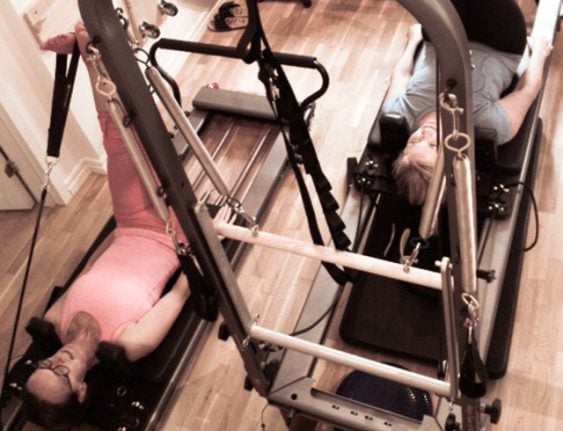Faith Clements didn’t exactly plan her career path in Sweden. Her body chose it for her.
Inspired by her brother’s idyllic life in the Swedish countryside, the Brit moved to the country in 2006, with the trade off being four-hour commutes to Copenhagen on a daily basis in order to keep up a successful job in finance.
“I love the countryside and had been riding horses a lot in the UK, so I decided it would be a great place to live,” she tells The Local.
“I was commuting four hours a day from Österlen to Copenhagen and had a successful career in international corporate finance spanning 25 years,” she adds.
It was all going perfectly well until chronic back issues kicked in, gradually making her stressful job and long commute more laborious. As the pain started to get worse, Clements realized she had to act.
She began learning about the condition and how to make it manageable, opting to take up Pilates, a physical fitness system first developed in the early 20th century by Joseph Pilates.
“I took a comprehensive Pilates education to find a solution, as my condition was rapidly declining. I needed to understand the science of anatomy and the practical application of movement to better manage my own condition,” she explains.
Though she didn’t originally plan on giving up her corporate job, it eventually became apparent that it couldn’t continue.
“I was conscious that I should consider a plan b in order to try and regain the ability to move and secure a quality in my future life. I was in a really desperate situation, nothing seemed to be working,” she notes.
Fortunately, the tools she had learned in an effort to try and improve her condition gave her a new set of skills that could be used to forge a new career. The Pilates studio she had built in her home for rehabilitation was also about to come in handy.
Faith in her Pilates studio. Photo: Faith Clements
“After I passed the examinations I realized I had the skills to begin teaching,” she recalls. So teach she did. In an effort to help others with similar problems, Clements set up the Limhamn Pilates Förening, a non-profit organization with a mission she describes as “bringing wellness through movement to the local community”.
“Progressing my own physical rehabilitation required a tremendous amount of patience, determination and a strong desire to be well. It also gave me the eyes and knowledge to see and work with physical dysfunction in others,” she says.
Having the skill-set is one thing, but starting a non-profit is another. Handily, Sweden provided plenty of help tackling what can sometimes be a tricky process, the instructor explains:
“The paperwork is always a bit daunting when you start anything in Sweden. But an organization called Föreningspool in Malmö offered a workshop with a supportive team on hand for advice. There were strict criteria to follow with setting the non-profit up, but that’s how it is in Sweden.”
Health-obsessed Sweden may be the ideal place to be doing something exercise-related, and the expert has seen Pilates start to gain some attention in the country.
“It’s gaining popularity, people are more aware and more studios are opening. I see Yoga classes incorporating Pilates principles, and there is definitely a crossover between the forms of movement,” she observes.
“The Swedes have been really positive. Some can’t believe how lovely it feels to move their body in the proper way again, we see tightness and stress melting away. People notice improved posture, less pain and stress. It significantly affects their daily life.”

Faith teaching. Photo: Faith Clements
The people who attend classes come from across the spectrum, she has noticed:
“Traditionally men have kept away from Pilates, but they are now understanding just how hard it is and how much they really need it. We have football and rugby players, dancers, mothers, old and young, people recovering from injury and illness. All ages and populations are welcome.”
Clements’ goals go beyond working with enthusiasts in Limhamn and the rest of Malmö. She also wants to do more for Pilates on an international level, as well as get new arrivals to the country involved.
“In 2017 we’re cooperating with the charity We Act Sweden, with an initiative that will bring Pilates to a wider international circle through the förening, and in particular work with immigrants here. Many of those people have suffered extreme stress and trauma, so Pilates will help provide a safe sanctuary for the mind and body to rest with some gentle functional movement.”
The new job has allowed Clements to travel with her work, and she is particularly proud of one benchmark, a trip to an international Pilates event on the Isle of Man.
“Going to the event was amazing. Four days with some of the most talented international teachers within the industry. Along with deep movement workshops we had some great letures on fundamental topics in movement science and anatomy,” she recalls.
Faith training. Photo: Faith Clements
In the future, she hopes that the exercise discipline will have a more cohesive industry behind it in Sweden:
“There is still a way to go to bring the industry together here, and it’s my hope the Pilates Förening can be influential.”
Even if there is still progress to be made however, helping people in Sweden to feel better physically has already been a hugely rewarding process for her.
“From football and rugby players, to those with pain and illness. From extreme adversity, to the personal rewards of now helping people towards improved health. It has been a real journey of inspiration,” she concludes.



 Please whitelist us to continue reading.
Please whitelist us to continue reading.